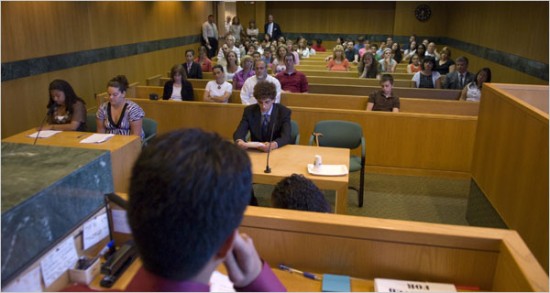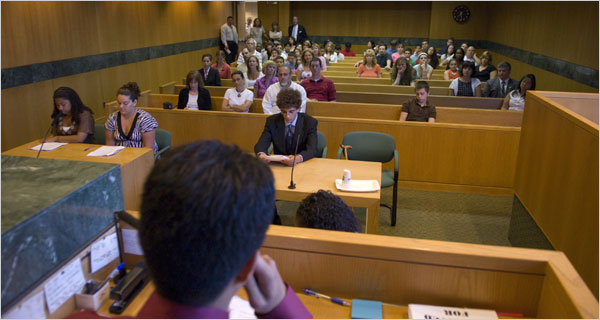Reading Time: 5 minutes
This morning I had the awesome opportunity to waste spend a couple hours of my life in traffic court because my tags had expired a couple decades ago (decades, months, what’s the difference, right?) and I didn’t know about it until a local police officer pulled me over last month to tell me. Anyway, as I sat in court, I watched people a lot and thought about what I was seeing and experiencing and I wondered how it all relates to Jesus and His church.
Here’s some of what I learned:
1. Traffic court isn’t fun. There aren’t any people dressed as clowns making balloon animals and dancing around to fast-paced music. I kept wondering if possibly this is how most people see the church. Probably. And since we’re all about trying to make people want to come to church, we often go to great lengths to make church fun. And the longer I sat in traffic court, the more I realized that maybe that isn’t such a bad thing. It’s not the most important thing (like many of us in ministry mistakingly think it is), but I felt bad for the people who just sat there staring blankly at the heads in front of them and found myself wanting to help lighten the mood. But I had no balloons, and so I just sat there and stared, too.
2. Traffic court isn’t easy to understand. In fact, it took me awhile to actually find it because there weren’t many clear signs. If I hadn’t seen the long line of people each asking the person in front of them if they were in the line for traffic court, I’d still be wandering the halls of the courthouse. And then, once you’re inside, there isn’t a lot of help. If the sign in table is blocked by people, you wouldn’t know to sign in, and there aren’t helpful people directing you where you need to go. It made me thankful for the awesome folks that wear brightly colored orange shirts at The Gathering every Sunday so that first time guests don’t have to wonder. Clear signs and simple instructions go a long way, too.
3. Traffic court isn’t relevant. Well, at least not until they finally call your name, and at that point it’s very relevant for about a minute. But for two or three hours, nothing that happens in that courtroom has anything to do with you. I don’t golf much (because I suck at it), but when I do, I’m usually good for one or two nice shots each round. Those shots make me want to play again – eventually – but if I hit more good shots, I think I’d play a lot more. Maybe people don’t come to our churches because too much time passes between the really good, relevant moments. We should try hard to have more of those because there’s nothing worse than sitting through an hour and a half of irrelevant, confusing stuff just to get 30 seconds of relevancy.
4. Traffic court is all about waiting. This may be the biggest thing I learned during my two hour visit to purgatory, and so this is where I really want you to hang out with me for a few minutes. The lesson I learned was a hard one, and it has everything to do with a scary trend in the American Church.
See, all the things I mentioned in numbers 1-3 are things that we can do something about, and so often we do. Churches spends tens and hundreds of thousands of dollars annually trying to make church more fun, more clear and more relevant. We fly to conferences and pay more money in the hope that some of their creativity will rub off on us, even if we don’t have a creative bone in our bodies. I’m not writing this to say we should or shouldn’t. I am writing this to make the following statement:
We can’t do anything about the wait. Nothing. Not. A. Thing.
As I sat there surrounded by others who were just sitting there, I noticed how restless so many people were. Their legs bounced up and down. Their faces got red when they thought someone had been helped before they should have been. They started looking around the room as if they could somehow burn a door that they could escape through. And then, it happened. A clerk stood up and announced that if anyone wanted a continuance, they should line up by the window, and half the room stood up and moved!
That line started moving, and for a moment I really wanted to get a continuance, too. It wasn’t so much that I wanted to come back to traffic court another day as much as I was just tired of being in a place that wasn’t fun, wasn’t clear and wasn’t relevant. Can you relate?
But then it dawned on me what was really happening. As these people got their new court date and started walking out, they were smiling, sure, but they weren’t done. They still had to come back…again. They’d still have to wait…again. They seemed like they were free, like they were able to “get on with their lives,” but in reality their lives were still stuck in traffic court. In fact, these people had made the worst decision possible: they had quit waiting after already having waited up to an hour and a half. That’s like waiting for a roller coaster and then dropping out of line just as you reach the ride.
The shame of it all is that American Christianity isn’t that much different, is it? We grow tired of the wait, and we seek a continuance. We try something new so we feel good again, or read the newest book with the biggest smile on the cover, or convince ourselves that God really wouldn’t ever ask his children to endure long waits and mundane days.
Umm, have you read the Bible? Sometimes, the wait is exactly what God wants for his children. In fact, it’s in the waiting that not only we grow, but our view of God grows, too. To his children waiting in exile and captivity (a little worse than traffic court, but not by much), he spoke through Isaiah the prophet and said,
Yet the Lord longs to be gracious to you; he rises to show you compassion. For the Lord is a God of justice. Blessed are all who wait for him! (Isaiah 30:18) (emphasis added)
We try so hard to get out of the things that God puts us in, and ultimately it dooms us to a cycle of waiting until we’re too frustrated to wait anymore, then asking for and getting a continuance, and then finding ourselves repeating the same cycle again somewhere down the road. No wonder so many in the American church feel like they’re stuck. Could it be that what we’ve totally misunderstood what it means to be free?
I learned something important today in traffic court: freedom doesn’t mean we never have to wait as much as we never have to worry about waiting.
It wasn’t long after the mass exodus that my name was called and I took care of business. As I was walking out of the courthouse, a lady came up behind me, told me she’d gotten her case continued and asked if I’d gotten my continuance.
“No,” I told her. “I’m done.”
She let out a long, slow sigh and simply said, “Oh.” It was the sound of someone who suddenly realized that just a little more waiting would have been the difference between feeling free and actually being free.
Don’t give up now. Not when you’re so much closer to a gracious God who is rising to show you compassion and to bring you justice. It won’t be much longer before you’ll hear him calling your name.












